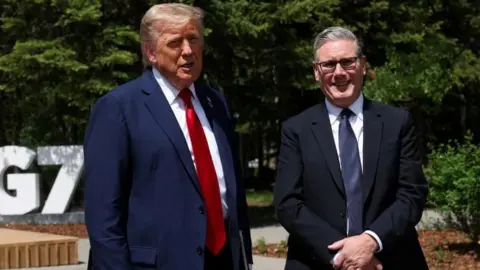In the realm of international politics, navigating sensitive diplomatic relations often resembles walking a tightrope—one misstep can lead to a significant fall. This precarious balancing act has become increasingly evident for Sir Keir Starmer, the Prime Minister of the United Kingdom, particularly in light of escalating tensions surrounding Iran. A recent series of U.S. airstrikes has exacerbated this delicate situation, raising concerns about the implications for Britain’s foreign policy and its relationship with key allies.
Starmer’s position has, in effect, been steeped in complications as he has advocated for a de-escalation of tensions. However, it appears that his overtures toward peaceful resolution have not resonated within the corridors of power in Washington. The U.S. administration, led by President Donald Trump, proceeded with military action, leaving Starmer in a tight spot as he tries to avoid direct involvement while still maintaining diplomatic rapport with the U.S. government.
The implications of the U.S. strikes are far-reaching. While the UK government seems to align with the desired outcome—namely, the delay of Iran’s pursuit of nuclear weapons—the method of achieving such results remains controversial. The UK has refrained from explicitly endorsing the military actions undertaken by the U.S., while asserting that the outcome aligns with the national interest of Britain. Intriguingly, just days before the airstrikes, Starmer demonstrated confidence in Trump’s restraint, having shared a dinner table with him at the G7 summit in Canada. “I was sitting right next to President Trump, so I’ve no doubt, in my mind, the level of agreement there was,” he remarked at the time.
However, four days later, Trump’s unexpected military intervention called into question Starmer’s judgment and forecasting ability regarding the U.S. President’s foreign policy decisions. The dynamic between Starmer and Trump raises pertinent questions: Had Starmer misread the U.S. leader’s intentions, or did Trump’s usually unpredictable foreign policy stance simply shift once more?
Despite advanced notice of the U.S. military action, the United Kingdom was not invited to participate in the airstrikes, leading to speculation about the proceedings. Initial theories suggested that U.S. stealth bombers might have utilized the UK’s Diego Garcia airbase as part of their operations. Ultimately, the airstrikes, dubbed “Operation Midnight Hammer,” entailed B-2 bombers flying directly to their targets without a stop in British territories.
Legal concerns have also emerged, with high-level discussions and consultations surrounding the legitimacy of potential UK involvement in the conflict. The opinion of Attorney General Lord Hermer was sought to outline possibilities concerning the legality of military engagement. As the conflict develops, the U.S. may indeed call for UK military assistance, placing Starmer in an even more complex position that requires careful scrutiny of legal and strategic considerations.
Looking ahead, the future of this diplomatic conundrum appears uncertain. U.S. Defense Secretary Pete Hegseth has sought to reassure both allies and stakeholders that the military responses will not precipitate a lengthy conflict. Nevertheless, both the Foreign, Commonwealth and Development Office (FCDO) and the Ministry of Defense (MoD) are reportedly bracing for possible Iranian retaliation, which has led to additional safety measures being implemented for British nationals in volatile regions. Reports indicate that a plan is underway for a flight to evacuate British citizens and their dependents from Israel and the occupied Palestinian territories.
As Starmer navigates these tumultuous waters, it remains uncertain how Iran’s reaction will materialize or what repercussions Britain might face. Despite maintaining a strong alliance with the U.S., marked by significant diplomatic discussions between Foreign Secretary David Lammy and American officials, the specter of conflict looms large. Starmer’s balancing act is undeniably precarious, and the intricate fabric of international relations may soon test the limits of his diplomatic dexterity and strategic foresight.



